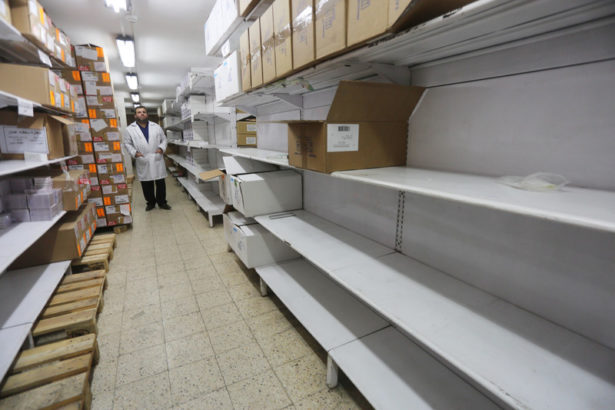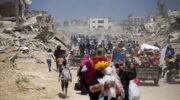Stocks of medicines are dangerously low at al-Shifa hospital in Gaza City. Mohammed AsadAPA images
A new report by the World Health Organization indicates Israel’s siege – imposed since 2007 – has disastrously affected Gaza’s healthcare system.
By Yousef M. Aljamal, reposted from The Electronic Intifada
Shaaban is a 10-year-old child with autism.
He requires assistance with his education, as well as medical treatment that costs up to $900 per month. Without his medicine, he can begin to scream, has difficulty sleeping at night and sometimes even loses consciousness.
Shaaban’s father Ibrahim works as a janitor at a local school. Amid a general economic slowdown caused by Israel’s siege of Gaza, Ibrahim has seen his monthly wages fall from approximately $450 to $350 in recent years.
He has four children to care for, including Shaaban. And almost half of Ibrahim’s wages go toward paying a bank loan that was issued to build the family’s home.
An additional problem is that most of the medicines Shaaban has been prescribed are not available in Gaza.
“I feel powerless,” said Ibrahim. “I can neither afford nor find the medicine Shaaban needs. It is too hard. I do all that I can for my son; I don’t know what more I can do.”
The Geneva-based Euro-Mediterranean Human Rights Monitor published the findings of its research on Palestinian children with autism in August. The organization stated that most parents of children with autism it interviewed complained that treatment was too expensive for them given that no financial support is provided by the authorities.
Disturbing picture
Israel’s siege – imposed since 2007 – has affected Gaza’s healthcare system enormously. A new report by the World Health Organization states that of the 516 items on Gaza’s essential medicines list, nearly half had less than a month’s stock remaining in 2018. The depletion of stocks had worsened by 15 percent since the previous year, the report adds.
Data from 2019 paint a similarly disturbing picture. During August, stocks of 225 essential medicines held in the central store of Gaza’s health ministry had run out by at least 90 percent.
Rana Hussein, a nurse at al-Shifa hospital in Gaza City, says that more than 60 cancer drugs are unavailable in Gaza. Treatments for diabetes and some kidney complaints are hard to find, too.
“There are 250 patients with thalassemia [a blood disorder] who lack medication,” Hussein said.
Improvements?
Israel’s frequent attacks on Palestinians taking part in protests has also placed considerable burdens on Gaza’s hospitals.
More than 1,000 people who have been injured are awaiting limb reconstruction treatment in Gaza, Nickolay Mladenov, the United Nations’ Middle East envoy, stated last month. Unless such treatment is provided, many limbs could be lost because of infection.
Mladenov has claimed that “some improvements were felt” in Gaza’s economy over the past few months. Unemployment has dropped from 47 percent to 46.7 percent, he said.
The improvements have not been felt by many ordinary people. And human rights monitors have drawn attention to how a new method for calculating unemployment data has been introduced in Palestine.
Gisha, a group campaigning against movement restrictions, has estimated that the real level of unemployment in Gaza has risen since last year.
Mahmoud is a 30-year-old unemployed man. Two of his children – Wissam, 8, and Lina, 7 – have epilepsy.
Wissam can have as many as five seizures per day. He has broken teeth and injured his hands while falling down.
“Impossible to afford”
A dose of levetiracetam – the main drug used to treat epilepsy – costs $150 each for Lina and Wissam per month – when it can be found. “This treatment is often not available in Gaza’s hospitals and pharmacies,” said Mahmoud, who does not have the money to buy the medicines, in any event.
The children’s mother Ghada is trying against the odds to remain optimistic. “After black clouds comes sunshine,” she said.
“I wish it was me [who had epilepsy], not you,” she added, looking at her children.
Imam Abdulrahman, now aged 23, was diagnosed with a heart condition in 2016. Since then he has had an aortic valve replacement operation.
It is vital that he takes regular medication to reduce the risk of a heart attack or a stroke. Like many others in Gaza, he and his family do not have the means to pay his medical bills.
Lacking a fixed job, Abdulrahman does occasional work in construction or as a cleaner.
He mainly relies on welfare payments paid to his father by the Palestinian Authority, headquartered in the occupied West Bank. The payments come to $400 and are only issued every three months.
“This is not enough money,” Abdulrahman said. “It is impossible for me to afford medicine to help me overcome my illness.”
Yousef M. Aljamal is a writer based in Gaza. Twitter: @YousefAljamal.
Additional reporting by Mustapha Aljamal.
RELATED:
GAZA STORIES: Nurse Nadia
WHO Special Situation Report – Gaza, occupied Palestine territory (6th April 2018)
Israel sets Gaza up for superbug epidemic





